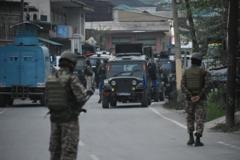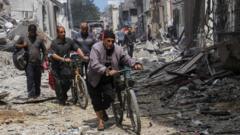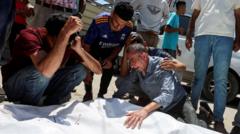The current situation presents a critical moment in India-Pakistan relations, with both nations bracing for potential consequences.
**Escalating Tensions: Analyzing India's Military Actions Amidst Kashmir Unrest**

**Escalating Tensions: Analyzing India's Military Actions Amidst Kashmir Unrest**
As India engages in military strikes following a tragic attack, fears of escalating conflict loom large.
India has recently intensified military operations against Pakistan and Pakistan-administered Kashmir, launching multiple strikes following a brutal attack on a tourist area in Indian-administered Kashmir. Dubbed "Operation Sindoor" by India's defence ministry, these actions aim to hold accountable those responsible for the horrific 22 April incident that resulted in the deaths of 25 Indians and a Nepali tourist.
However, Pakistan has vehemently denied involvement, branding the strikes as "unprovoked." In response to India's military actions, Prime Minister Shehbaz Sharif denounced the attacks, threatening repercussions for what he termed a "heinous act of aggression." The Pakistani military has claimed to have intercepted five Indian aircraft and a drone amidst the ongoing hostilities, while asserting that the airstrikes have killed eight civilians. In a contrasting report, India claims three locals were victims of Pakistani shelling in Indian-administered Kashmir.
Targets of the Indian strikes were purportedly locations involved in orchestrating terrorist activities across the border. The Indian government insists that their operations were precise, focusing on avoiding military facilities and civilian casualties. However, Pakistan contends that the strikes struck civilian areas, dismissing India's assertions of targeting militant camps as misleading.
These military actions follow heightened tensions stemming from the aforementioned attack in Pahalgam, where militants specifically targeted Hindu men, resulting in a significant civilian death toll—the worst in two decades. In the wake of this tragedy, Indian Prime Minister Narendra Modi declared an intent to pursue the attackers relentlessly, although no specific militia was named as responsible. While Indian authorities allege that two attackers were Pakistani nationals who had connections with militant groups, Pakistan maintains its stance of non-involvement.
The two nations have engaged in several retaliatory measures in the weeks leading up to the strikes, including visa suspensions and diplomatic expulsions. Observers had anticipated this escalation, drawing comparisons to previous incidents that have fueled conflict between the nations, like the Pulwama attack of 2019.
Kashmir remains a perpetually volatile region, claimed by both India and Pakistan but controlled in parts since the 1947 partition. The area has seen armed conflict and insurgency, with significant implications for regional stability. The escalations not only threaten to exacerbate long-standing tensions between the nuclear-armed neighbors but have also drawn international concern.
In wake of the unfolding situation, global leaders, including UN Secretary-General Antonio Guterres and U.S. President Donald Trump, have urged for de-escalation and dialogue, highlighting the pressing need to diffuse potential conflict and ensure regional security.





















